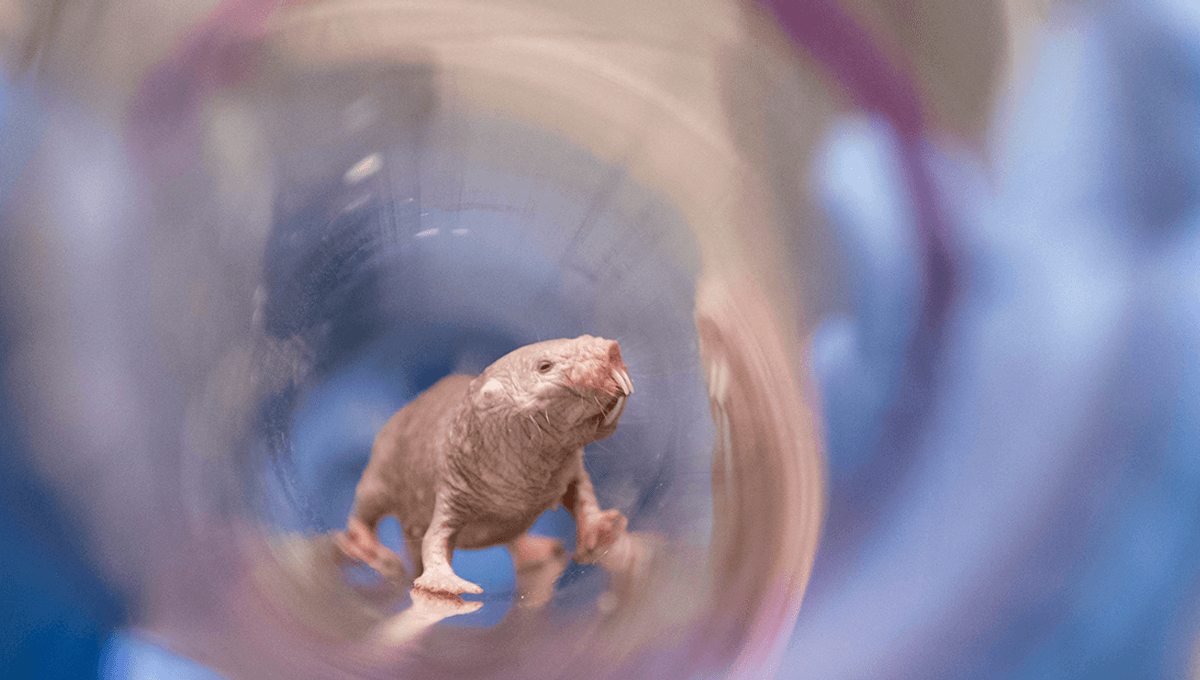
Naked mole-rats (Heterocephalus glaber) are famous for a lot of things: their peculiar appearance, being one of only two eusocial mammal species, and having a queen female that is the only member of the colony that breeds. These queens can produce one to five litters per year with an average of 13 pups per litter meaning a naked mole-rat queen could produce thousands of offspring across her 30 year plus lifespan.
These bizarre creatures have been studied extensively by experts as they almost never get cancer despite being the world’s longest-lived rodent and some species don’t feel pain. Now researchers are looking into the fertility aspect of naked mole-rats to understand how the females can keep producing litters of pups as they age.
“Naked mole-rats are the weirdest mammals,” said lead author of a new study Miguel Brieño-Enríquez, assistant professor at Magee-Womens Research Institute and the University of Pittsburgh School of Medicine’s Department of Obstetrics, Gynecology and Reproductive Sciences, in a statement. “But to me, the most amazing thing is that they never stop having babies – they don’t have a drop in fertility as they age. We want to understand how they do this.”
Most mammalian females are born with all the eggs they will ever have, these are produced through oogenesis. These egg cells deplete with age, some are released during ovulation and some die off, therefore the fertility of most mammals declines with age.
Not so in the naked mole rat, prompting questions about how the tiny rodents can keep producing so many offspring. Three theories are suggested: that they are born with a far greater number of egg cells, not as many of those eggs cells die as the rat ages, or that they have a method for producing more eggs cells after they are born. “My favorite hypothesis is that they use a cocktail of all three,” continued Brieño-Enríquez.
The study then found evidence to support all three of these ideas. By comparing naked mole rats to mice at different stages of development, they found some surprising results. A mouse life span is typically around four years whereas a naked mole-rat could live for more than 30 years, with a maximum lifespan of more than 37 years. At eight days old, a naked mole-rat female was found to possess 1.5 million egg cells, about 95 times more than a mouse that was eight days old.
An even more shocking finding was that naked mole-rats are able to make egg cells after birth and that the entire process of oogenesis occurs postnatally. This means that naked mole-rat females are born without any egg cells and then make them all as pups. The team found that egg precursor cells were dividing in animals that were three months old and that the precursor cells were still present in animals that were as old as 10 years, suggesting that they are capable of making more egg cells throughout their lives.
“This finding is extraordinary,” said senior author Ned Place, professor at the Cornell University College of Veterinary Medicine. “It challenges the dogma that was established nearly 70 years ago, which stated female mammals are endowed with a finite number of eggs before or shortly after birth, without any additions being made to the ovarian reserve thereafter.”
The team hope that by understanding how oogenesis works and in identifying the extremely large ovarian reserve in naked mole-rats, they will be able to develop new drugs or techniques that could help better understand and preserve human fertility.
“Even though humans are living longer, menopause still happens at the same age. We hope to use what we are learning from the naked mole-rat to protect ovary function later in life and prolong fertility,” said Brieño-Enríquez.
The paper is published in Nature Communications.
Source Link: Naked Mole-Rats Can Produce Offspring Their Entire Lives And Now We Know Why